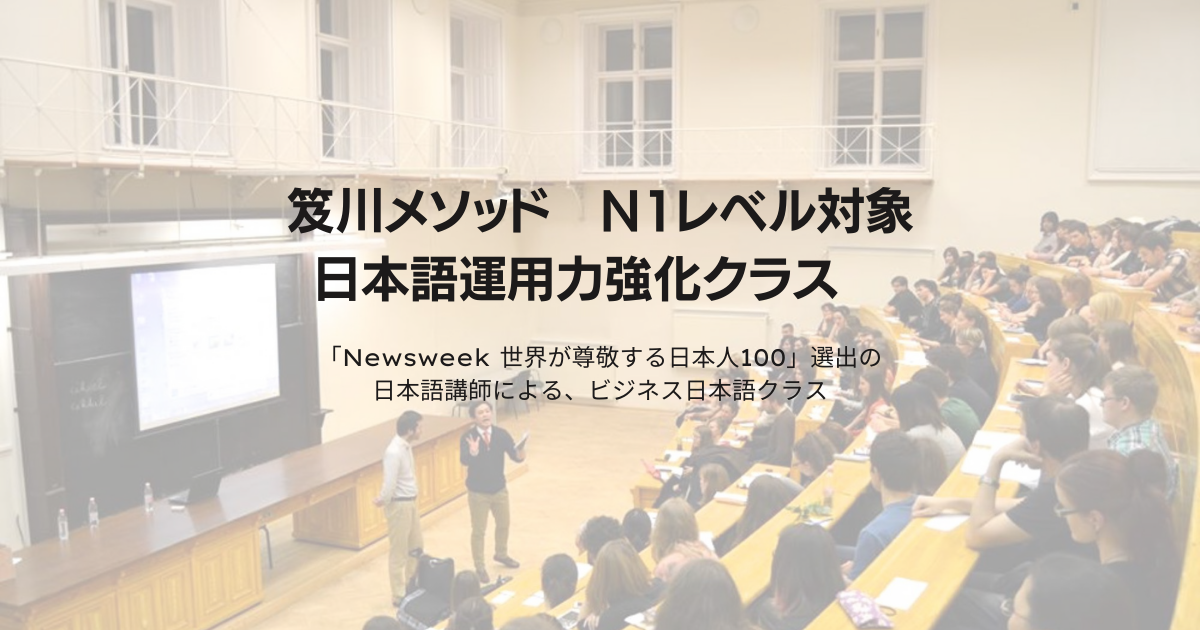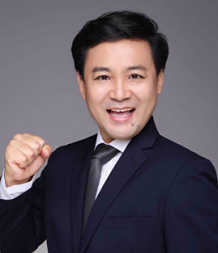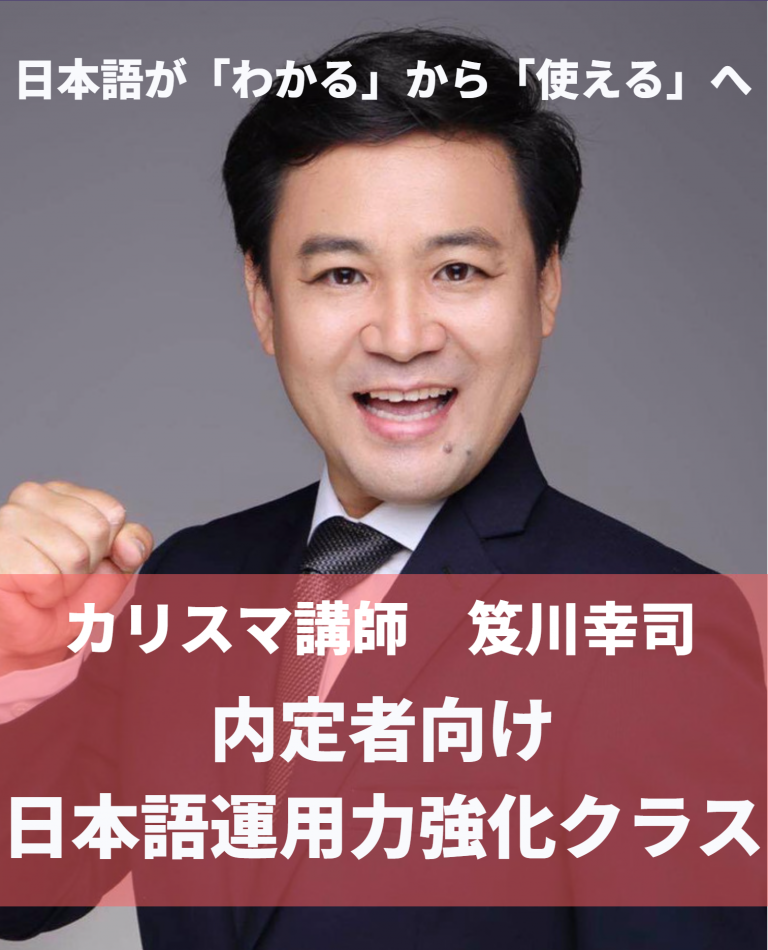
■Overview
It is not uncommon for students who have passed the Japanese Language Proficiency Test N1 to face challenges when using Japanese in real work situations, even though they may have performed well during interviews. Concepts like “Hourensou” (reporting and communicating updates) and the cultural nuances of “being proactive” can pose initial difficulties for foreign employees working in Japan. This issue is not about a lack of understanding the Japanese language itself, but rather a lack of knowledge regarding how to effectively use it.
Our course, led by renowned Japanese language instructor Mr. Koji Oikawa, who is often referred to as the “Charismatic Japanese Language Teacher” and has been featured on Japanese TV program “Gyakuten Jinsei,” is designed to strengthen the advanced Japanese language proficiency and practical skills of participants over a period of approximately three months. Through case studies and discussions, the course aims to enhance the practical usage of business Japanese, while also promoting a deeper understanding of Japanese work culture and minimizing the gaps experienced in the workplace.
■What’s offered in the class
①Not just “understanding” Japanese, but being able to “use” it effectively
We have prepared a curriculum where you can acquire practical Japanese language skills through original teaching materials provided by our instructors.
②Understanding work culture through scenario simulations
Every class will include practical exercises that simulate common business situations such as “self-introduction in the department,” “having lunch with colleagues,” “consulting with a supervisor,” “business presentation,” and more. These exercises are designed to provide hands-on practice for situations frequently encountered in the business setting.
③Comprehensive preparation for writing tasks that may be challenging for individual students
We will implement a system where students submit mini-reports after each Japanese language class, and the instructor will provide detailed feedback and corrections.
④Thorough pronunciation practice
We will also thoroughly focus on pronunciation practice, which tends to be overlooked but can become a significant communication barrier. Students often express that they find it highly beneficial as they may not have had much prior exposure to formal pronunciation training.

■Instructor: Koji Oikawa

■Feedback
・Mr. Oikawa’s teaching style was very different from the Japanese language classes I had attended before. I hadn’t paid much attention to pronunciation practice and pitch accent until now, but thanks to Mr. Oikawa’s consistent guidance, my pronunciation of greetings and various expressions that can be used in daily life has improved significantly. The content used for presentations and conversation practice in class was always interesting and left a strong impression. While practicing speaking, I also learned about the Japanese way of thinking and the appropriate attitudes for working in a company.
・The teacher’s way of speaking, study methods, voice tone, providing examples while teaching, speaking with heartfelt dedication, review sessions, expressing opinions to each other, and conversing in breakout rooms were all of very high quality.
・The most memorable class for me was the one where the method of conducting debates was introduced. Learning to express my own opinions and impressions while respecting the views of others in a polite manner is a skill that I believe will be useful in the future as well.
■The desired level of Japanese proficiency
①Being able to use appropriate language depending on the situation, such as with colleagues, superiors, or business partners.
②Being able to provide a concise and accurate explanation of a company’s strengths and policies.
③Being able to accurately introduce the distinctive features of one’s own company when comparing it to others.
④Being able to quickly assess one’s role in group work or pair work and effectively explain and describe activities.
⑤Being able to explain social issues faced by Japan or one’s own country and express considerate opinions.
⑥Being able to extract the necessary data from simple statistical data and provide personal analysis alongside it.
■Regular curriculum is offered twice a year from January to March and from July to September
January to March |
July to September |
|
Part1 |
★Japanese comprehension(3-hour class×3 classes=9 hours) |
★Learning and acquiring expressive abilities(3-hour class×4 classes=12 hours) |
| ・Learning the patterns of how to greet, ask questions, and express opinions. ・Utilizing verb categorization to reduce grammar mistakes. ・Mastering the conjugation of verbs, adjectives, and adjectival nouns. |
・Clear and reassuring Japanese expressions that give the listener a sense of ease. ・What is the necessary way of speaking in the workplace? Understanding and experimenting with adjusting intonation, variations, voice, pacing, facial expressions, and gestures to match the interlocutor. |
|
Part2 |
★Japanese language output skills.(3-hour class×3 classes=9 hours) |
★Etiquette and engaging expression methods.(3-hour class×4 classes=12 hours) |
| ・Vocabulary compilation for thriving in society. ・Engaging in discussions and making statements using conversational examples and newspaper articles as topics. ・Understanding the true nature and underlying meaning of patterns and being able to masterfully utilize them. ・Tips for effective explanations and techniques for making requests. |
・What does “being polite” mean for Japanese people? Understanding the appropriate attitude based on the situation. ・The relationship between Japanese language proficiency and overall expressive abilities. ・Considering how to convey one’s own charm and find effective methods of expression. |
|
Part3 |
★Business conversation(3-hour class×7 classes=21 hours) |
★Practical Japanese expressions(3-hour class×10 classes=30 hours) |
| ・Memorizing the “Hourensou” (reporting, updating, and consulting) communication model. ・Role-play training. Introducing classmates to others and creating a positive impression on the person being introduced. ・Acquiring the skill of speaking while considering the emotions and situation of the listener. |
・Developing the ability to adapt language choices to the individual and responding with a sense of urgency. ・Developing skills that immediately convey a perception of being “highly skilled” to those around you. ※Dividing the training into conversation and written components, aiming to achieve immediate adaptability to work-life through practical exercises. |
|
Part:4 |
★Business communication skills.(3-hour class×7 classes=21 hours) |
★Understanding the background of the other person and expressing a sense of empathy and consideration.(3-hour class×2 classes=6 hours) |
| ・Fostering interest to build trust. ・Finding common ground and creating an environment where abilities can be easily utilized. ・Increasing persuasiveness through concrete explanations using numbers, specific examples, and relevant locations. ・Understanding and creating business documents. ・Developing presentation skills. ・Practical exercises tailored to business scenarios. |
・How to interact with elderly individuals and pregnant women. ・Gaining basic knowledge about ADHD, Asperger’s syndrome, and depression, as well as understanding the importance of considering the background. The aim is to develop the ability to communicate effectively with others, both within and outside the organization. |
※The curriculum and allocation of hours may be subject to change.
(関連リンク)
>>「日本での就業」 × 「日本語教師」のキャリアを持つ外国人講師が率いる、外国人が日本の組織で活躍するための集中80時間
>>【2021年「秋」特別授業】ビジネス日本語運用力アップ講座

